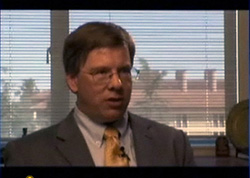David Dill on Jim Lehrer Newshour
Who: David Dill (Stanford), ACCURATE PI
What: Interview, by Spencer Michaels on Jim Lehrer Newshour
Date: January 16, 2008
Video: http://www.pbs.org/newshour/bb/politics/jan-june08/ballot_01-16.html
Summary: David Dill discusses security issues with electronic voting machines in California in the wake of the California Secretary of State’s Top-to-Bottom Review (TTBR). Dill was not part of the TTBR, but many other ACCURATE personnel were. Here he comments extensively on the implications of the TTBR findings.
The State of California is racing to fix unexpected problems with its voting machines before its Feb. 5 primary. NewsHour correspondent Spencer Michels reports from the Golden State on these recent ballot troubles.
JIM LEHRER: And finally tonight, another kind of politics story: security concerns about California’s voting machines, leading to that state’s February 5th primary. NewsHour correspondent Spencer Michels reports.
SPENCER MICHELS, NewsHour Correspondent: County election officials in California, faced with three upcoming elections, are scrambling to keep up with the fast-changing world of voting machines.
They claim that changes to voting system requirements ordered by California’s secretary of state, Debra Bowen, may put the integrity of those elections in jeopardy.
Bowen, who as a state legislator was regarded as one of the most tech-savvy politicians in Sacramento, was elected secretary of state a year ago by promising to clean up a chaotic election system. She ordered some machines decertified after she commissioned a top-to-bottom look at the devices by computer scientists from UC Berkeley.
DEBRA BOWEN, California Secretary of State: Our scientists found that every system they looked at could be compromised in ways that made me uncomfortable.
They were able to bypass security seals by undoing two screws and opening the whole machine. They were able to change the results without having any knowledge of the computer code itself.
SPENCER MICHELS: While Stanford computer scientist David Dill was not on Bowen’s panel, he followed its work carefully.
DAVID DILL, Professor of Computer Science, Stanford University: In three different computer systems, there are ways that a single poll worker or maybe a voter could actually take over the entire system, basically control every vote in the next election.
SPENCER MICHELS: How would that work?
DAVID DILL: Well, in one of the systems, votes are communicated back to the central office by writing them on smart cards, on little storage devices.
And it was shown that if a virus was written on the smart card, it could infect the central server back at the election office. And then, from there the virus could propagate out to the individual voting machines in the next election.

